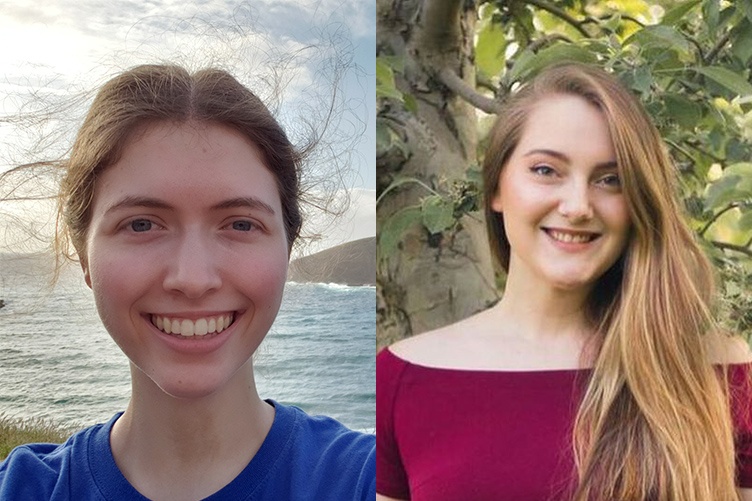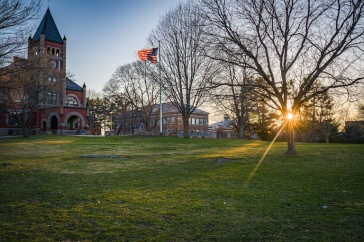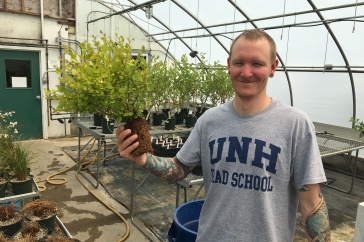
Audrey Coleman '21 and Alyssa Greig '21 are the recipients of 2020 Barry Goldwater Scholarships.
Alyssa Greig ‘21 and Audrey Coleman ‘21 will receive assistance with their college expenses next year as recipients of Goldwater Scholarships, considered the nation’s premier undergraduate honor for science, math, engineering and technology (STEM) majors.
Named for Sen. Barry Goldwater, who served in the U.S. Senate for 30 years, the Goldwater Scholarship rewards students who plan a career in research, providing up to $7,500 a year to help cover costs such as tuition, mandatory fees, books and room and board. Winners regularly have an average GPA of 3.85 or higher. Greig and Coleman are both in the honors program.
Greig is a biomedical science major with a concentration in medical microbiology who got involved in research on an epidemiological project during her freshman year. That was followed by research that sought to identify sources of fecal contamination in water. In 2019, she began doing research with Victoria Jeffers, assistant professor of molecular, cellular and biomedical science.
“I have always wanted to work with infectious diseases,” Greig says. “I've been researching gene regulation in the parasite responsible for toxoplasmosis — or ‘crazy cat-lady disease.’”
A Hamel Scholar, Greig is a member of Alpha Chi Sigma, the chemistry fraternity on campus, has volunteered as a learning tutor for general chemistry courses and was an undergraduate teaching assistant for microbiology labs.
The Londonderry, New Hampshire, resident plans to pursue a Ph.D. in microbiology or computational biology studying viral infections, particularly dangerous diseases such as Ebola or Marburg, in hopes of better understanding how the viruses cause disease and how that information can be used to make vaccines and treatments.
“The Goldwater Scholarship has truly opened up so many doors for me, and it also was an incredible confidence booster,” Greig says. “I'm sure like many other researchers, I've struggled with a lot of imposter syndrome, thinking that my achievements were due to some mistake or misunderstanding. Receiving the Goldwater has shown me that my achievements do mean something, that I am capable of great things, that when I fail it is not because I am flawed, and that what I've achieved isn't due to chance.”
Coleman is studying physics with a minor in astronomy. With a goal of working for NASA, she intends to pursue a Ph.D. in astrophysics. Knowing she wanted to apply for the Goldwater Scholarship, she talked with her research advisor, who suggested she apply for a NASA internship, and to the International Research Opportunities Program. She was accepted to both. Unfortunately, due to the coronavirus, the research program she had planned to attend in Ireland this summer has been canceled.
During the summer of 2019, Coleman interned with NASA at the Marshall Space Flight Center in Huntsville, Alabama, with astrophysicist Colleen Wilson-Hodge, who studies gamma ray bursts and solar flares.
“In 2017, the Fermi Gamma-ray Burst Monitor detected a gamma ray burst that coincided with a neutron star merger. Since then astrophysicists have been trying to increase the chances of seeing another coincident event,” Coleman says. “My job during the 10-week internship was to check that their search still found all the stronger GRBs and that it gave the correct location for them.”
Coleman, a Manchester, New Hampshire resident, is already looking toward graduate schools where she can continue the research she began with NASA.
“I had a great time getting to see what it's really like to work for NASA. Dr. Wilson-Hodge even wrote one of my recommendation letters for the Goldwater,” says Coleman, who is a STEMbassador and secretary of the Society of Physics Students. “I think it really helped my application to not just say I want to do research in high energy astrophysics with NASA, but to also be able to say that I have already done so with great success.”
Winning the Goldwater validates “that I am a capable physicist and can accomplish my goals,” Coleman says.
This year the Goldwater Foundation selected 393 recipients from an application pool of 1,343 students nominated by 461 academic institutions. Since the first award in 1989, more than 9,000 scholarships have been awarded, totaling more than $71 million.
-
Written By:
Jody Record ’95 | Communications and Public Affairs | jody.record@unh.edu



















































